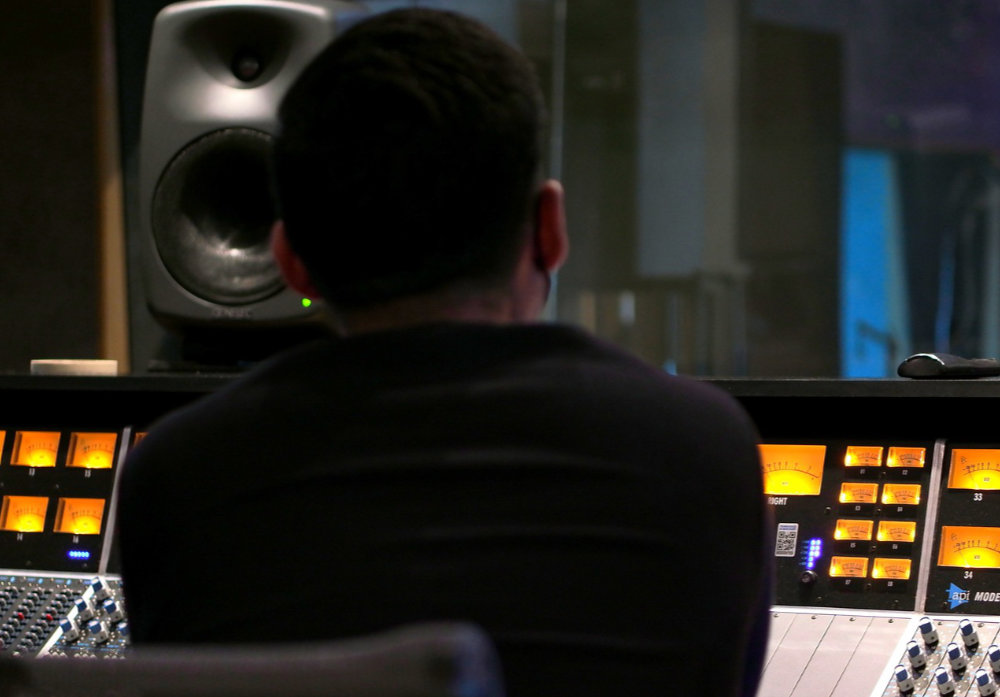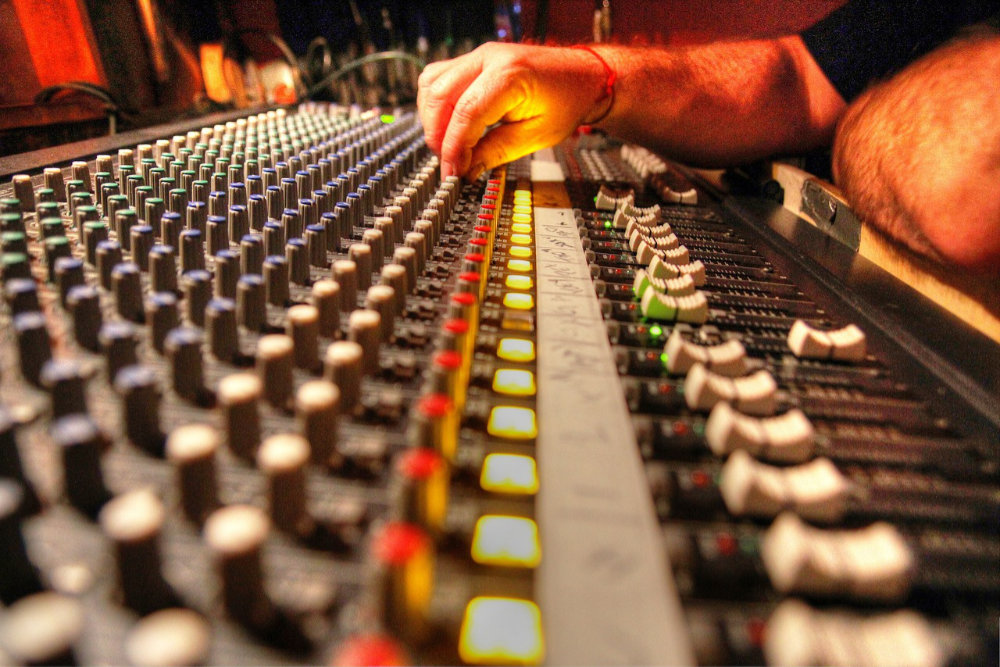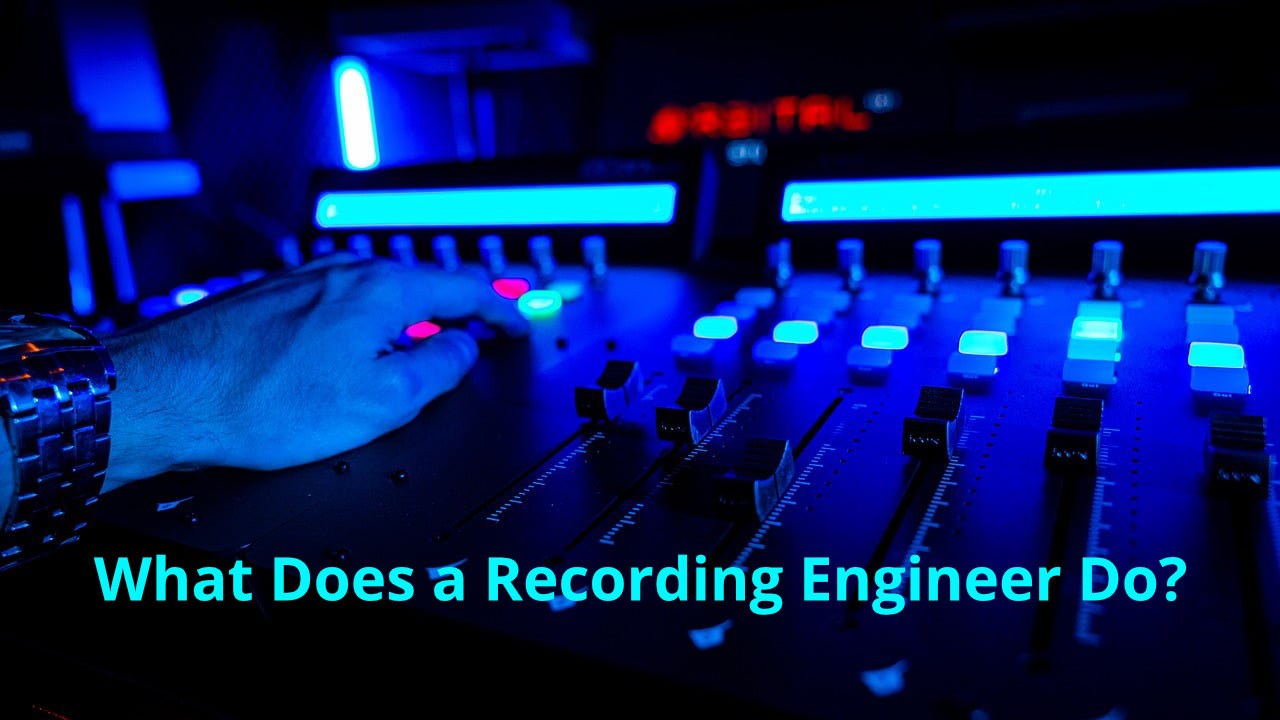Estimated reading time: 13 minutes
Step right into the fascinating world of audio engineering, where creativity meets technicality. Here, audio engineers are the puppet masters pulling the strings behind the scenes. They create, shape, and mould the sounds that delight our eardrums, taking us on a sonic journey.
But who exactly is this unsung hero? What does a recording engineer do? And how do they contribute to the music business? Let’s turn the volume up and tune in to find out.
Table of contents
- Who is a recording engineer?
- What does a recording engineer do?
- The importance of recording engineers in the music business
- The recording process: From pre-production to post-production
- Recording techniques and audio processing techniques used by recording engineers
- The role of recording engineers in sound design
- The artistic vision and technical knowledge: The dual role of a recording engineer
- The career path of a recording engineer: From recording studios to freelance engineers
- Essential skills for a successful recording engineer: Music theory, audio technology, and more
- The relationship between a music producer and a recording engineer
- How to become a recording engineer
- Conclusion: The future of the recording engineer role in music production
- FAQ
Who is a recording engineer?
So, who is a recording engineer? Well, they’re the wizards behind the curtain, the conductors of the audio orchestra. They’re the skilled technicians who capture, manipulate, and reproduce sound. Whether it’s for music, film, television, or live performances, they’re the ones making the magic happen.
But it’s not all about pressing buttons and twisting knobs. No, these audio engineers have a deep understanding of the technical aspects of sound, including how it behaves, how to capture it, and most importantly, how to make it sound amazing.
What does a recording engineer do?
Now to the crux of the matter: what does a recording engineer do? Well, they wear many hats during recording sessions. One moment, they’re setting up microphones and equipment, and the next, they’re tinkering with audio levels and effects. They’re involved in every stage of the audio production pipeline, from pre-production planning to post-production polish.
Recording engineers are responsible for ensuring quality recordings. They adjust and control the sound captured during recording sessions, using a wide range of audio processing techniques. They’re the guardians of sound, ensuring that every note, every beat, and every sound effect shines through in the final mix.
| Task | Description |
|---|---|
| Set up equipment | Arrange microphones and gear for recording sessions. |
| Adjust audio levels | Control sound levels during recording to ensure quality recordings. |
| Apply audio effects | Add effects like reverb or compression to enhance sound. |
| Edit and clean up tracks | Refine recordings by removing noise, adjusting timing, and polishing tracks. |
| Mix and master recordings | Blend individual tracks, balance levels, and finalize the overall sound quality. |
| Collaborate with team | Work closely with artists, producers, and other team members to achieve desired outcomes. |
| Troubleshoot technical issues | Resolve any technical problems that arise during recording sessions or post-production. |
| Stay updated on technology | Keep abreast of advancements in audio technology and techniques to improve skills and workflow. |
The importance of recording engineers in the music business
In the music business, recording engineers are indispensable. They’re the technical backbone of the industry, transforming raw musical talent into polished audio gold. Whether it’s for a chart-topping pop artist or an underground indie band, a talented recording engineer can make all the difference.
But their role goes beyond the technical. Recording engineers also contribute to the creative process. They’re the bridge between the artist’s vision and the final product, shaping the sound to fit the mood, style, and message of the music.

The recording process: From pre-production to post-production
The recording process is a journey, and our trusty recording engineer is at the helm. It starts with pre-production, where they collaborate with artists and producers to plan the recording sessions. This includes everything from choosing the right microphones to planning the layout of the recording studios.
Next comes the recording itself, where the engineer captures the music, ensuring the best possible sound. And then it’s onto editing, where they clean up the tracks, adjust timing, and apply effects.
Finally, in post-production, the recording engineer mixes the tracks, balances the levels, and masters the final product. It’s a meticulous process, but the result is a well-produced, high-quality audio track that’s ready for the world to hear.
| Stage | Description |
|---|---|
| Pre-production | Collaborate with artists and producers to plan recording sessions, select equipment, and establish recording goals. |
| Recording | Capture musical performances using chosen equipment and techniques, ensuring optimal sound quality. |
| Editing | Refine recorded tracks by adjusting timing, removing imperfections, and applying necessary edits and effects. |
| Mixing | Blend individual tracks, adjust levels, pan positions, and apply effects to achieve a balanced and cohesive mix. |
| Mastering | Finalize the mixed tracks by optimizing overall sound quality, ensuring consistency, and preparing for distribution. |
| Post-production | Deliver the finished product, meeting client expectations and addressing any final adjustments or revisions. |
Recording techniques and audio processing techniques used by recording engineers
There’s a whole toolbox of recording techniques and audio processing techniques that recording engineers use. From microphone placement and room acoustics to equalization and compression, they use these tools to shape the sound.
But it’s not just about the technical. These techniques also serve a creative purpose, adding depth, warmth, and character to the music. Whether it’s the rich resonance of a well-placed microphone or the punchy impact of a well-timed compressor, these techniques add the finishing touches that make a recording truly shine.
A overview of Recording techniques and audio processing techniques
| Technique | Description |
|---|---|
| Microphone Placement | Positioning microphones to capture desired sound sources effectively, considering factors like distance, angle, and room acoustics. |
| Room Acoustics | Understanding and manipulating the acoustic characteristics of the recording space to achieve desired sonic qualities. |
| Equalization (EQ) | Adjusting the frequency response of audio signals to enhance clarity, balance tonal characteristics, and remove unwanted frequencies. |
| Compression | Controlling the dynamic range of audio signals by reducing the difference between loud and soft sounds, resulting in a more consistent sound level. |
| Reverb | Adding reverberation effects to simulate the acoustic environment, creating a sense of space and depth in the recording. |
| Delay | Introducing delayed repetitions of audio signals to create echo effects, enhance spatial perception, or add rhythmic interest. |
| Saturation | Applying harmonic distortion to audio signals to emulate the warm, analog sound of vintage recording equipment. |
| Filtering | Filtering out or emphasizing specific frequency ranges in audio signals using high-pass, low-pass, band-pass, or notch filters. |
| Noise Reduction | Removing unwanted noise from recordings, such as background noise, hum, hiss, or clicks, without significantly affecting the desired audio. |
| Spatial Processing | Manipulating the stereo image of audio signals to adjust the perceived location, width, and movement of sound sources within the mix. |
| Time-Based Effects | Applying effects that alter the timing or temporal characteristics of audio signals, such as chorus, flanger, phaser, or tremolo. |
| Dynamic Processing | Using tools like gates and expanders to control the dynamics of audio signals, reducing noise or shaping the envelope of sounds. |
| Automation | Programming changes in volume, panning, effects parameters, or other mix parameters to occur automatically at specific points in the recording. |
| De-Essing | Attenuating excessive sibilant sounds in vocal recordings, such as “s” and “sh” sounds, to improve clarity and reduce harshness. |
| Pitch Correction | Adjusting the pitch of recorded vocals or instruments to correct tuning errors or achieve desired musical intervals. |
The role of recording engineers in sound design
In the realm of sound design, recording engineers play a crucial role. They’re the ones who capture and create the sounds that bring stories to life. Whether it’s the eerie ambiance of a haunted house, the rumble of a spaceship engine, or the subtle rustle of leaves in a forest, they create the sonic landscapes that immerse us in different worlds.
But sound design isn’t just about creating sound effects. It’s also about using sound to support the narrative, evoke emotions, and enhance the overall experience. And that’s where the expertise of the recording engineer comes in.
The artistic vision and technical knowledge: The dual role of a recording engineer
A recording engineer’s job is a delicate balance between technical knowledge and artistic vision. On one hand, they need to understand the science of sound, the intricate workings of audio equipment, and the ins and outs of audio technology. On the other, they need to have a keen ear for music, a sense of creativity, and a knack for bringing out the best in a recording.
This dual role can be challenging, but it’s also what makes the job of a recording engineer so rewarding. Every day, they get to combine their passion for music with their technical skills to create something truly special.

The career path of a recording engineer: From recording studios to freelance engineers
The career path of a recording engineer can take many forms. Some start in recording studios, learning the ropes as assistants before working their way up. Others might go freelance, offering their services to a variety of clients and projects.
But whether they’re working in a studio or going solo, one thing’s for sure: it’s a career that requires a dedication to learning and honing their craft. After all, in the fast-paced world of audio engineering, staying on top of the latest techniques and technologies is a must.
Essential skills for a successful recording engineer: Music theory, audio technology, and more
Speaking of skills, there are a few that every successful recording engineer should have in their repertoire. First and foremost is a solid understanding of music theory. This includes everything from rhythm and harmony to the structure and composition of music.
Next is a good grasp of audio technology. This includes knowing how to use a wide range of audio equipment, software, and tools. And of course, they need to have a keen ear, an attention to detail, and a knack for problem-solving.
But it’s not just about technical skills. A successful recording engineer also needs to be a good communicator, able to work well with artists, producers, and other team members. They need to be flexible and adaptable, ready to tackle whatever challenges come their way.
A overview of Essential skills
| Skill | Description |
|---|---|
| Music Theory | Understanding fundamental concepts such as rhythm, melody, harmony, and structure to effectively work with musical elements in recordings. |
| Audio Technology | Proficiency in using recording equipment, digital audio workstations (DAWs), audio interfaces, and other hardware/software tools essential for audio production. |
| Critical Listening | Developing keen listening skills to discern nuances in sound, identify imperfections, and make informed decisions during recording and mixing. |
| Problem-Solving | Ability to troubleshoot technical issues that arise during recording sessions or post-production, finding efficient solutions to ensure smooth workflow. |
| Communication | Effective communication with artists, producers, and other team members to understand their vision, provide guidance, and collaborate effectively. |
| Attention to Detail | Meticulous attention to detail in recording, editing, and mixing processes to ensure high-quality results and maintain professional standards. |
| Time Management | Efficiently managing time and resources during recording sessions, editing tasks, and project deadlines to deliver projects on schedule. |
| Adaptability | Flexibility to adapt to changing requirements, unexpected challenges, and evolving technologies in the fast-paced field of audio engineering. |
| Creativity | Harnessing creativity to experiment with different techniques, effects, and approaches to achieve unique and innovative sonic outcomes. |
| Problem-Solving | Analytical thinking and problem-solving skills to address technical issues, optimize workflow efficiency, and overcome obstacles in the recording process. |
| Collaboration | Collaborating effectively with artists, producers, and other team members to translate creative visions into successful audio productions. |
| Organization | Organizing project files, session data, and workflow processes to maintain clarity, efficiency, and consistency throughout the recording process. |
| Continuous Learning | Commitment to ongoing learning and skill development to stay updated on industry trends, new technologies, and advanced recording techniques. |
| Adaptability | Ability to adapt to different musical genres, recording environments, and client preferences while maintaining a high level of professionalism. |
| Interpersonal Skills | Building rapport and fostering positive working relationships with clients, colleagues, and industry professionals to facilitate collaboration and success. |
The relationship between a music producer and a recording engineer
The relationship between a music producer and a recording engineer is a key element in the music production process. They’re two halves of the same audio coin, each bringing their own expertise to the table.
The music producer is the visionary, guiding the creative direction of the project. They work closely with the artist to shape the sound and mood of the music. On the other hand, the recording engineer is the technical expert, responsible for turning that vision into a reality.
Together, they form a dynamic duo, working in harmony to create a final product that’s both technically sound and creatively inspiring.
How to become a recording engineer
So, how does one become a recording engineer? Well, it starts with a passion for music and sound. From there, many aspiring engineers pursue formal education in audio engineering or a related field. This provides a solid foundation of technical knowledge and hands-on experience.
But the learning doesn’t stop there. Many budding engineers start their careers as interns or assistants in recording studios, learning the ropes under the guidance of experienced professionals. It’s a journey of continuous learning and growth, but for those with the passion and determination, it’s a rewarding path to follow.
Becoming a sound engineer – Video
Conclusion: The future of the recording engineer role in music production
Looking ahead, the role of the recording engineer in music production continues to evolve. With advancements in audio technology and the rise of home studios, the landscape is changing. But one thing remains constant: the need for skilled, creative engineers who can craft high-quality sound.
So, here’s to the unsung heroes of the audio world. Here’s to the recording engineers, who continue to shape the soundtrack of our lives, one note at a time.
Related Posts
- How to Start Making Music? A Beginner’s Guide
- How to Make Music? The Ultimate Guide to Making Music: From Beginner to Producer
- How to Become a Music Producer? The Ultimate Blueprint to Becoming a Music Producer
- What does it mean to sell your soul in the music industry
- What is Sampling in Music? Understanding the Intricacies of Music Sampling
- Is House Music EDM? How House Music EDM Ignites the Party Scene
- Best DAW to Record Vocals – Discover the Ultimate DAW for Professional Vocal Recording
- The Beginner’s Guide on How to EQ Vocals for Stellar Sound
- What Is Gain in Audio? Understanding Gain in Simple Terms
- What is Audio Normalization? Breaking Down the Basics
- What is a Riff in Music? Setting the Rhythm Free
- Mastering in Ableton: Elevate Your Music to Professional Quality
FAQ
To become a recording engineer, a combination of formal education and hands-on experience is beneficial. Pursuing a degree or certificate in audio engineering or a related field provides essential technical knowledge. Additionally, internships or assistant positions in recording studios offer valuable practical experience in the field.
Successful recording engineers possess a solid understanding of music theory, proficiency in audio technology, and keen attention to detail. They must also have effective communication skills to collaborate with artists, producers, and other team members. Flexibility, adaptability, and problem-solving abilities are also crucial in this dynamic field.
In sound design, recording engineers play a vital role in capturing and creating sounds that enhance storytelling and evoke emotions. They collaborate with filmmakers, game developers, and other creatives to craft immersive auditory experiences. Utilizing their technical expertise and creative flair, recording engineers shape sonic landscapes that bring narratives to life.
Recording engineers bridge the gap between artistic vision and technical execution in music production. They work closely with artists and producers to realize creative goals, shaping the sound to match the mood, style, and message of the music. Through their expertise in audio processing techniques, recording engineers elevate musical compositions to new heights.
The role of recording engineers in music production is expected to continue evolving alongside advancements in audio technology. With the rise of home studios and digital platforms, opportunities for freelance engineers may expand. However, the demand for skilled professionals who can deliver high-quality sound remains constant, ensuring a promising future for recording engineers.
